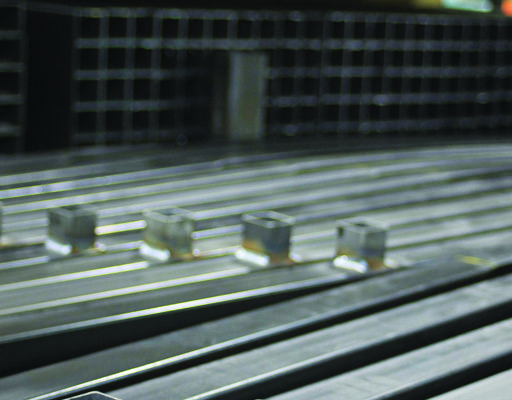Turning into the Wells Fargo parking lot the other day, I paused to glance at a semi-truck and trailer already there. The colorful graphic said “Greenhouse in the Snow” on what amounted to a mobile billboard – another kit to facilitate inside agriculture.
After hearing Russ Finch tell 4-H members and parents about his greenhouse, I spent a little more time learning about how he developed a partnership with Allen Bright, owner of Antioch Machine, LLC, to form Greenhouse in the Snow.
“His original greenhouse is made of wood (and it) rotted. Russ came to me to buy steel to rebuild it,” Allen recalled. Dixie Nelson, who was the Alliance Chamber of Commerce director then, was with Russ in the shop and told him he needed to make a business out of it. That seed of a suggestion germinated and grew slowly, at first. After buying the steel, Russ came back a few months later asking Allen to build the frames for about a dozen greenhouses. He obliged, bending the metal all by hand.
A few years later, Allen constructed his own at home where vegetables and flowers have flourished since. Seeing that water wouldn’t freeze, even at minus 25, really convinced him of the greenhouse’s capabilities.
Seven to eight years ago “(we) started to make this transition. He (Russ) said you need to be prepared to do this when I’m gone,” Allen said. When the partnership started, Russ, “told me he was almost 78 years old and didn’t need another business – he turned 90 in March.”
Initially, the machine shop sold about 20 a year. In 2019, production reached 50 or so, then 110 in 2020 and 164 this past year. Allen said the pace is even quicker in 2022, counting 49 to date. Colorful pins on maps in the Antioch Machine hallway show where all 450 kits have become productive structures in the lower 48 United States, Canada and Europe.
St. John’s Lutheran Church in Alliance will be one of the next recipients. Whether across town or across multiple time zones, the process is the same. Length is the most significant variable for the 17-foot wide greenhouses. Allen said their longest has been 168 feet, while most new orders are in the 96 to 120-foot range. “It would be 45-60 days before you get it,” he said. “Demand is such we can’t keep it in stock. We’re building all the time.” The kits include the blower motor and basic components such as frame, fasteners, connectors and covering.
The machine shop started with more of a repair role in 1997. Allen said, “Before long we realized more of our work was going to be manufacturing.” Greenhouses are not the only environmentally friendly product the company has a hand in. “We build quite a lot of parts for an off-grid solar company,” he noted.
It had been years since my last visit to Allen’s shop. He reminded me about not looking at the welding processes as we walked through. The brilliant white tip never seemed to stop moving as greenhouse components came off the line. Well, their robot (The Daemon) had been assembling stakes for the frames all morning and never asks for a coffee break. Allen said the machine is two to three times as fast as a person and cuts out the repetitive motion (required by a human welder) with a “better, more consistent weld.” Other machines cut, bend and drill holes in the square tubing. The overall process is efficient, resulting in just 200 pounds of scrap from a semi-truck load of material, Allen said.
Automation has been an asset as Greenhouse in the Snow continues to grow. The product itself has also improved. “We’re modifying the greenhouse continuously . . . what (Russ) achieved with that first greenhouse was just to open the door of what’s possible,” Allen said. “There are some of those things (talking to customers) just obvious what you missed.”

